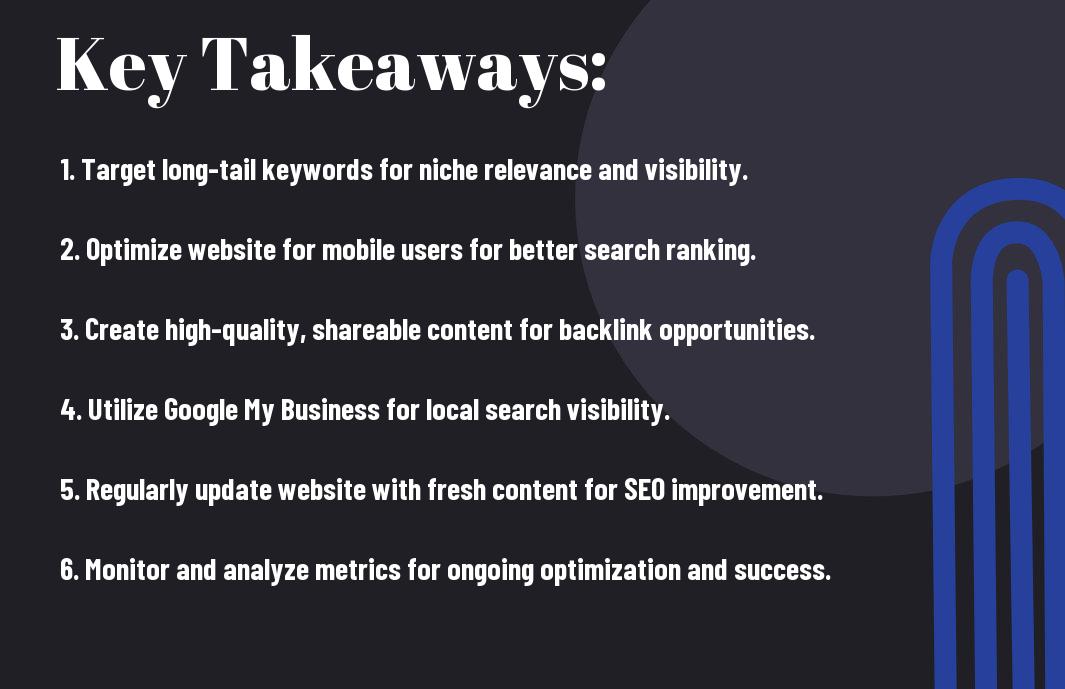Many small businesses strive to improve their online presence and reach a wider audience. Implementing effective Search Engine Optimization (SEO) strategies is crucial in achieving this goal. In this blog post, we will explore valuable tips and tricks that small businesses can utilize to enhance their SEO marketing efforts and boost their online visibility. By mastering the art of SEO, small businesses can level the playing field with larger competitors and attract more organic traffic to their websites. Let’s explore the world of SEO marketing and discover how small businesses can thrive in the digital landscape.
Key Takeaways:
- Keyword Research: Conduct thorough keyword research to identify target keywords that align with your small business and customers’ search intent.
- On-Page Optimization: Optimize your website’s meta tags, headings, and content with target keywords to improve search engine visibility and rankings.
- Local SEO: Focus on optimizing your Google My Business listing, obtaining local citations, and generating positive reviews to enhance local search visibility for your small business.

Understanding SEO and Its Benefits
What is SEO?
On the journey of mastering SEO for your small business, it is crucial to start with a solid foundation of what SEO actually is. SEO stands for Search Engine Optimization, a practice that involves optimizing your website to improve its visibility on search engines like Google. By incorporating relevant keywords, producing high-quality content, and enhancing user experience, you can increase your website’s chances of ranking higher in search engine results.
Advantages of SEO for Small Businesses
One of the key advantages of implementing SEO strategies for your small business is the potential to attract a targeted audience of potential customers who are actively searching for products or services that you offer. By appearing on the first page of search engine results, you can significantly increase your website traffic and ultimately boost your sales and revenue.
Another advantage of SEO for small businesses is its cost-effectiveness compared to traditional marketing methods. With a well-planned SEO strategy, you can reach a larger audience without breaking the bank on expensive advertising campaigns. Additionally, by consistently optimizing your website for search engines, you can establish your brand as a trustworthy authority in your industry, building credibility and loyalty among your target audience.
For a comprehensive guide on building a successful Small Business SEO Strategy, check out this Small Business SEO Strategy Guide.

Getting Started With SEO
Your SEO tips for small businesses can make a significant impact on your online presence and visibility. By implementing effective SEO strategies, you can enhance your website’s performance and attract more potential customers.
Setting Up Your Website for SEO
With the increasing competitiveness in the online market, having a well-optimized website is important for small businesses. Ensure your website is mobile-friendly, contains relevant keywords, has a clean URL structure, and loads quickly to improve user experience and search engine rankings.
Keyword Research Strategies for Small Businesses
Setting the right foundation with keyword research is crucial for the success of your SEO efforts. Understand your target audience, identify relevant keywords, analyze search volume and competition levels, and incorporate long-tail keywords to drive organic traffic to your website efficiently.
Understanding the search intent behind keywords is also key to developing a successful SEO strategy. By aligning your content with what users are looking for, you can improve your website’s visibility and attract qualified leads to your small business.
Advanced SEO Techniques
- On-Page Optimization Tips
1. Quality Content 2. Meta Tags Optimization 3. Keyword Placement 4. Internal Linking 5. Image Optimization 6. URL Structure
On-Page Optimization Tips
- Optimizing your website’s content with relevant keywords and ensuring meta tags are up to date can significantly improve your site’s visibility. Internal linking and well-structured URLs also play a pivotal role in boosting your SEO efforts. Knowing where to place keywords strategically is key to enhancing your on-page optimization.
Off-Page Optimization Tricks
Techniques for off-page optimization involve strategies outside of your website to improve its search engine ranking. On the off-page side, link building and social media engagement are instrumental in building your site’s authority and credibility. It is vital to focus on acquiring backlinks from reputable sites and engaging with your audience on various platforms to increase your site’s visibility and trustworthiness.
Monitoring and Maintaining Your SEO
Keep a close eye on your SEO efforts to ensure your small business is maximizing its online presence. Refer to Small Business SEO: How To Grow Your Business’s Traffic for expert tips and strategies to improve your SEO strategy.
Tools for Tracking SEO Performance
Performance tracking is crucial to understanding the effectiveness of your SEO efforts. Utilize tools like Google Analytics, SEMrush, Moz, and Ahrefs to monitor keyword rankings, organic traffic, backlinks, and overall site performance.
Adapting to Changing SEO Trends
Tools and strategies in SEO are constantly evolving, requiring businesses to stay informed and adapt to changes in search engine algorithms. Keep up with industry news, attend webinars, and leverage tools like Google Trends and Search Console to adapt your SEO strategy accordingly.
Changing SEO trends can impact your website’s visibility and traffic. Staying ahead of these trends will help your small business maintain a competitive edge and drive organic traffic to your site.
To wrap up
As a reminder, implementing effective SEO strategies can greatly benefit small businesses looking to increase their online visibility and attract more customers. By optimizing your website with relevant keywords, developing quality content, and building backlinks, you can improve your search engine rankings and drive organic traffic to your site. It’s important to regularly track and analyze your SEO efforts to make necessary adjustments and stay competitive in the digital landscape. With dedication and consistency, small businesses can leverage SEO marketing to achieve long-term success and grow their online presence.
FAQ
Q: What is SEO Marketing?
A: SEO (Search Engine Optimization) marketing is a digital marketing strategy that focuses on improving a website’s visibility in search engine results. The goal of SEO marketing is to increase organic (non-paid) traffic to a website by optimizing content, keywords, and other elements to rank higher in search engine results pages.
Q: Why is SEO Marketing important for small businesses?
A: SEO Marketing is crucial for small businesses because it helps them compete with larger companies online. By implementing effective SEO strategies, small businesses can improve their online visibility, attract more targeted traffic, and increase their chances of converting visitors into customers. This can lead to increased brand awareness, higher sales, and long-term business growth.
What are some tips and tricks for success in SEO Marketing for small businesses?
A: Some tips and tricks for success in SEO Marketing for small businesses include:
– Conducting keyword research to identify relevant and high-traffic keywords
– Optimizing on-page elements such as title tags, meta descriptions, and heading tags
– Creating high-quality, relevant content that is valuable to your target audience
– Building quality backlinks from reputable websites
– Monitoring and analyzing your SEO efforts using tools like Google Analytics
By implementing these strategies and staying updated on best practices, small businesses can improve their search engine rankings and drive more organic traffic to their websites.
CATEGORY:Website Design

